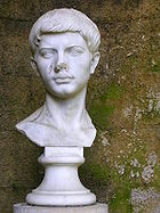
poet of the Augustan period
. He is known for three major works of Latin literature
, the Eclogues (or Bucolics), the Georgics
, and the epic Aeneid
. A number of minor poems, collected in the Appendix Vergiliana
, are sometimes attributed to him.
Virgil is traditionally ranked as one of Rome's greatest poets. His Aeneid has been considered the national epic
of ancient Rome since the time of its composition to the present day.
Umida solstitia atque hiemes orate serenas,agricolae.![]()
Ut varias usus meditando extunderet artispaulatim.![]()
Ignavum, fucos, pecus a praesepibus arcent.![]()
Latet anguis in herba.![]()
Omnia fert aetas, animum quoque.![]()
Cantantes licet usque (minus via laedit) eamus.![]()
Omnia vincit amor; et nos cedamus amori.![]()
Arma virumque cano.![]()
Forsan et haec olim meminisse iuvabit.![]()
Equo ne credite, Teucri.quidquid id est, timeo Danaos et dona ferentis.![]()

